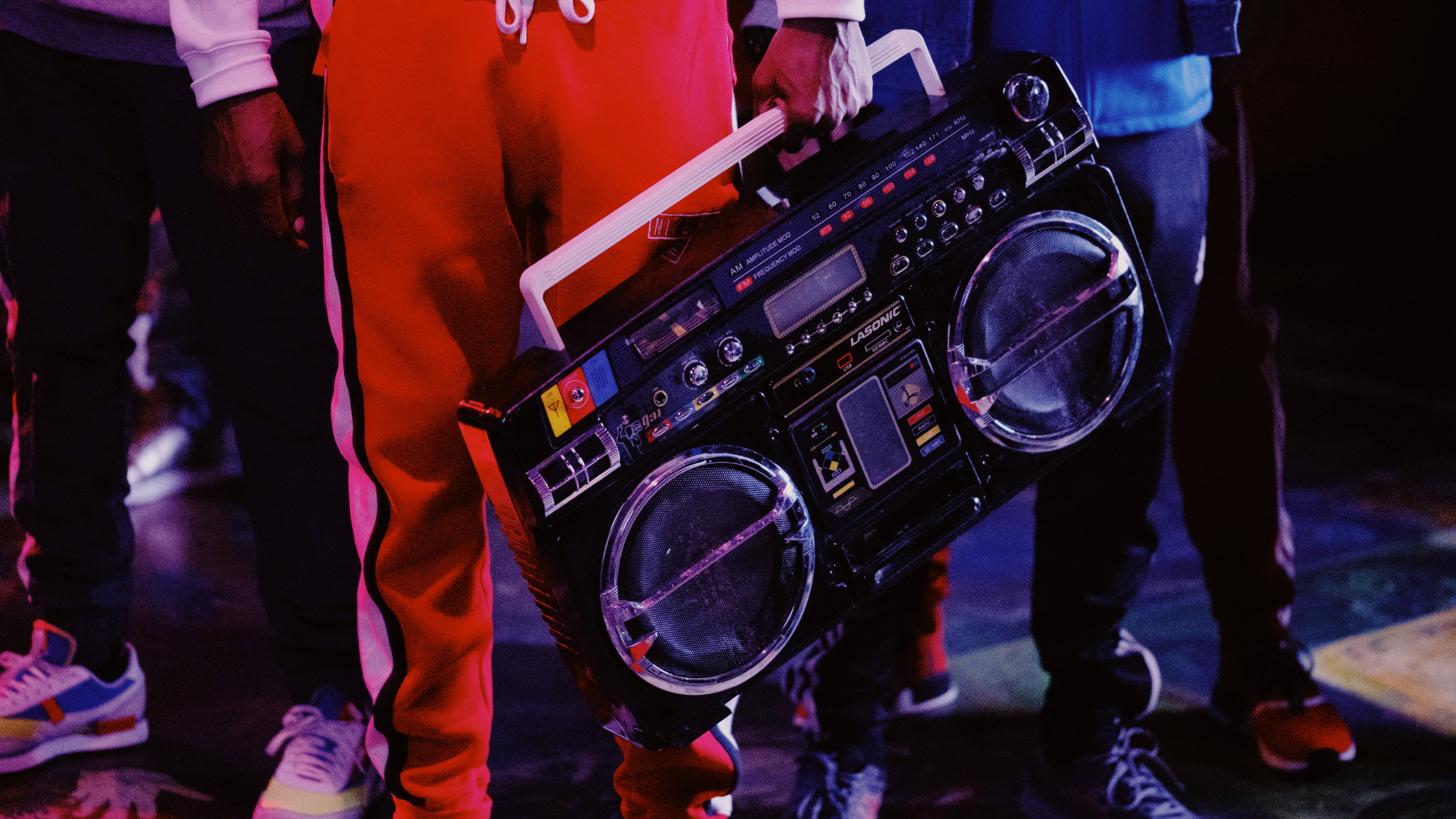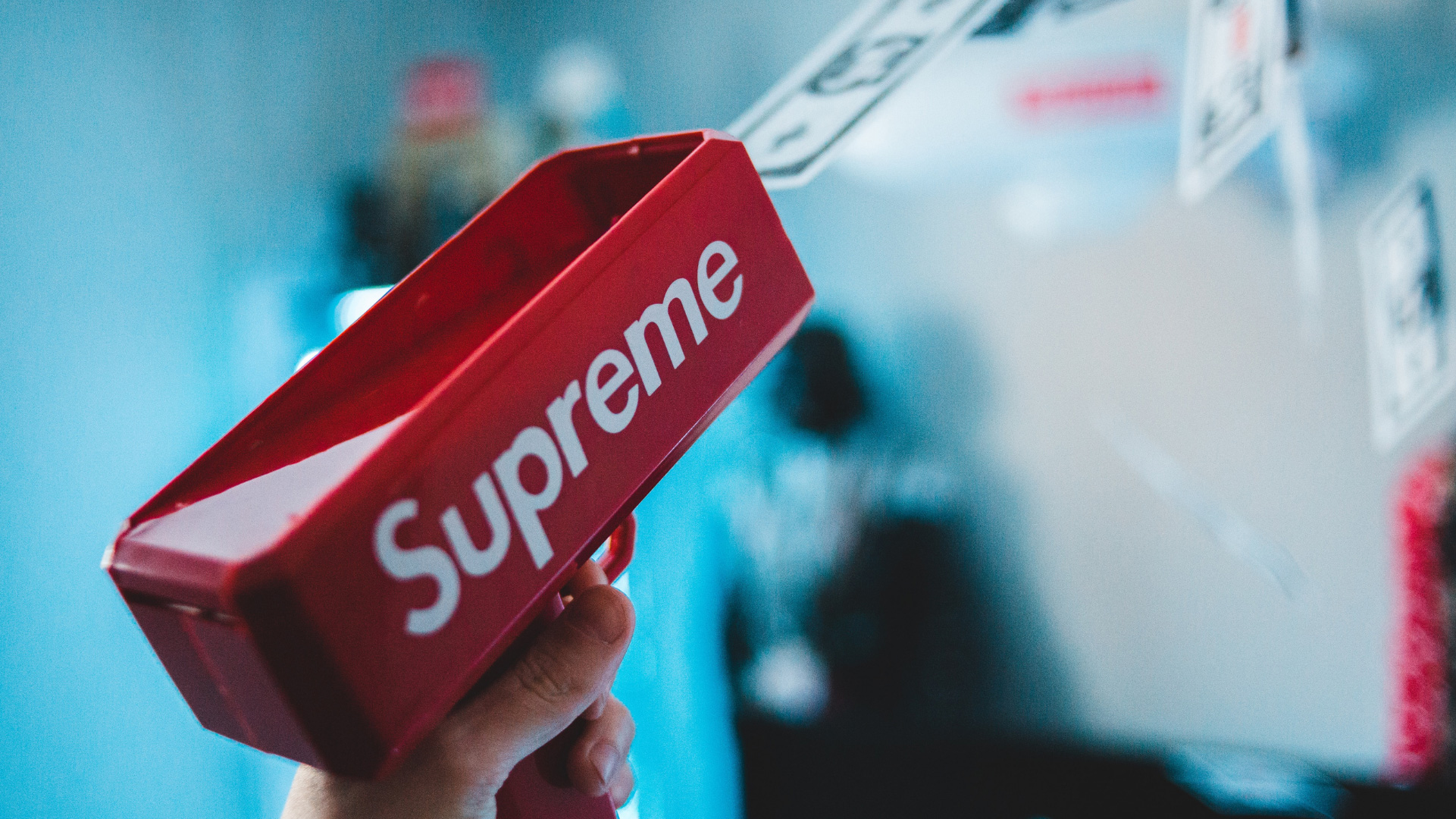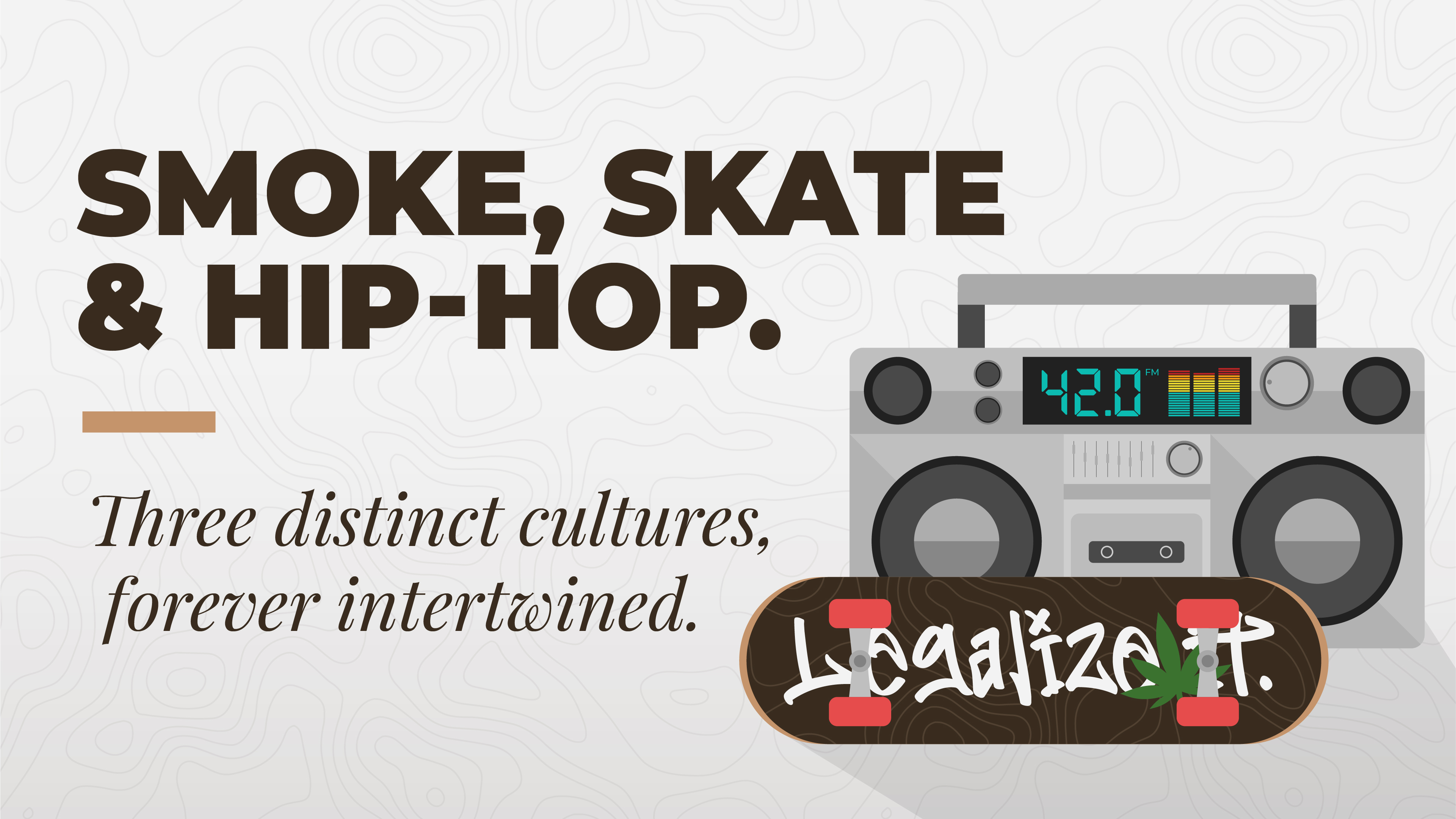How the Worlds of Cannabis, Skate, and Hip-Hop Came Together
Published by Denise Mckenzie on Sep 17th 2021

In recent years, we've seen the cannabis industry evolve from black market status to a multi-billion dollar industry, quickly becoming a normalized commercial powerhouse. Concurrently, two other paramount subcultures emerged from the tenacious underground alongside reefer's road to fame: hip-hop and skate culture.
With humble roots beginning in the streets of major cities, rebellious underlings from coast to coast were fueled by a have-to do-it-yourself mentality, often stemming from communities disenfranchised, disregarded, and rejected.
Cannabis, skate, and hip-hop communities have continually shown their alliance(s) throughout the years not just culturally or geographically, but also politically, progressively, and financially.
This three-way relationship has undoubtedly paid off with the onset of legal cannabis, launching the underground phenomena into commercial success, and I'll tell you - Business is booming.
A Historical and Cultural Juxtaposition
The connection between skate and hip-hop is cheek by jowl clad with blunt or bong. The extensive history and intertwining affiliations are endless. Still, if we're to cover any points in the history of any of it, it's to say that no matter what- the three belong and thrive together.
Skate and Hip-Hop's Evolution and Love Affair with Cannabis
The first commercial skateboards appeared in 1959 after surfers in California figured out a way to attach wheels to their boards and "sidewalk surf." However, it wasn't until the 1970s, when magazines started promoting youngster skaters like Tony Alva and Stacey Peralta, that it became a worldwide craze.
These were the early days of the Zephyr Skate Team (Z-Boys), where Alva fondly recalls toking with the crew before dropping into an empty pool in the backyard of suburban homes and skating around Venice Beach (AKA Dogtown). Tony Hawk became THE Tony Hawk here.

These young California kids probably weren't thinking about professional careers in skateboarding at the time, and legal weed you can buy a store? Get out of here! It probably would have gotten a good laugh, though, because these pioneers were all about good times and Cali vibes, and no one could stop them.
The Early Beats of Hip-Hop
While the Z Boys were laying the groundwork of weed-smoking skate culture on the west coast, early forms of hip-hop began to make ripples in the streets of NYC. Not long afterward, emcees in the surrounding boroughs began to create groundbreaking new music by mixing diverse sounds with record-scratching and vocal hooks as deejays hosting house parties. Hip-hop pioneers like Grandmaster Flash, Jazzy Jay, and Fab Five Freddy, among MANY others, set the pace and BLEW up.

Throughout the 1980s and into the early 1990s, the stylish sounds of this new music genre could be heard blasting from boomboxes across the city, very likely followed by wafting blunt-scented breezes, defining a new era of urban culture in New York City, and quickly, the world. This was also around the same time skateboarding's youth culture came into fruition, and the underground following started to take off.
Listen to the History of Hip-Hop in 100 Tracks on Spotify.
Beastie Boys, Spike Jonze, and Girl Skateboards
As the skate and hip-hop scenes progressed on the east and west coasts, they began to merge into a more diverse and distinctive street culture. But, there was one driving force that no one saw coming that fast-tracked the new scene- A little group known as the Beastie Boys.
Their unique relationship with skateboarding while becoming hyped-up weed-smoking hip-hop Rockstar's incited the fire to open the subterranean portal of the underground realms, imploring a new generation to do create something new that belonged to them.
With the wild world of 1970-80s NYC scene at their young fingertips, Mike-D, M.C.A., and Ad-Rock explored the boroughs from subway to subway, picking up on the ever-present diversity of the city and expressing themselves through all styles of music, graffiti art, skateboarding, and camaraderie.
Video Courtesy of Vevo.
The Beastie Boys wore "Get Blunted" tee shirts on stage and often referenced smoking weed in their songs and music videos. After relocating to Los Angeles briefly, the Beastie Boys, along with friends Spike Jonze and Mike Carroll, shot "Looking Down the Barrel of a Gun," featuring street-skaters hitting the pavement across the city, as well as shots of the jokester crew getting stoned, wearing costumes, and generally goofing around. Later, Jonze and Carroll would go on to found Girl Skateboards with fellow skaters Megan Baltimore and Ryan Howard. Chocolate Skateboards, Girl's sister company, would be formed later.
Introducing a New Lifestyle
By the mid-nineties, street skating grew tremendously in popularity, and hip-hop (and probably a lot of weed) helped to charge up-and-coming skaters' creativity with its music and aesthetic. A brand new lifestyle was born, cross-influencing open-mindedness, curiosity, cannabis, idealism, and innovation. Oh, and Streetwear (with a capital "S") developed thanks to the early influences of hip-hop, its more contemporary subgenre gangster rap, and skate culture globally.
The NYC Skate Scene and KIDS Help to Define a Generation
Skaters had and were figuring out creative ways to evolve the sport, which meant leaving the empty backyard pools and vert ramps for city sidewalks, park benches, trash cans, and whatever else they could land a trick on. Harmony Korine's coming-of-age drama entitled KIDS featured innovative street skaters, like Harold Hunter, Justin Pierce, as well as the rest of the OG Zoo York skate team, portraying themselves as a ragtag group of city kids navigating serious issues like AIDS, poverty, being apart of marginalized communities, and dysfunctional family units.

At the same time, the world got a real glimpse of what contemporary street culture was like for REAL kids living in NYC at the time- where friends and fun reigned well over the cold, hard truths of reality. Including blunt smoking, boombox blasting, and street skating was crucial to accurately represent the time and what it was like to be there.
If you want to know more about NYC's scene in the mid-nineties, check out this year's new indie documentary, which premiers at the 2021 Tribeca Film Festival, entitled All Streets are Silent. It offers an authentic glimpse of 90s culture, frozen in a long-gone New Yorkian "Youthtopia" that thrived nearly thirty years ago.
Mainlining the Mainstream
As the rise in popularity of hip-hop and skateboarding continued to blow up, it opened up a plethora of opportunities for the leaders of the scene(s) to make money, especially in the skate world. Streetwear brands began popping up, and new brands were being built around the success of the genres.
Supreme Opens Its First Retail Location
The original Supreme store opened on Lafayette Street in the Lower East Side in, spring of '94. It established itself as the first lifestyle brand representing hip-hop, skate, and street culture. Supreme was THE spot to get all your gear and hang out with the homies. Supreme did everything from hosting events to selling apparel and accessories to making skateboards and sponsoring skate teams. Actors and extras from the movie KIDS were the store's first employees, including the ZOO York crew.

Today, Supreme is a hugely popular global brand collaborating with big players in the cannabis industry like Mike Tyson and high fashion staples like Louis Vuitton. With the shared DIY ethos of these collaborating cultures, Supreme found wild success over the last three decades, proving to be one of the first to break ground and find a way into the mainstream.
Chad Muska's WeedStashPocket Skate Shoe
A few years later, after the original Supreme store opened, Chad Muska, known for his street style, wearing baggy pants and long white tees, rocking a ball cap and boombox along with his skateboard, was killing the game. He also monetized off the budding skate industry by producing the first $100 skate shoe. His infamous WeedStashPocket shoes hit the retail shelves in '98. Primarily inspired by Air Jordans IVs, which were the SHIT back then and still are), the éS Muska signature model was the only one of its kind and featured a stash pocket underneath the shoe's tongue.

Original ad for Chad Muska's éS Skate Shoes.
The shoe was obviously perfect for skating, and if you had hollow trucks on your skateboard, you might have figured out how to use it as a pipe (yes, it's true- you can do that!), then you're all set! Those knee-long nineties pockets could remain empty and light for better agility to settle the sickest tricks.
Gangster Rap, The Chronic, and Medical Marijuana
The signature subgenre of hip-hop, Gangster Rap, developed first in the mid to late 80s with legendary groups like NWA featuring legends Dr. Dre and Ice Cube. The release of "Straight Out of Compton" drew much attention to the emerging west coast rap scene.
Video Courtesy of YouTube.
By 1996, when California became the first state to legalize medical marijuana, references to smoking became just as common as were the storytelling lyrics of life on the streets, hustling, and gang life.
Cannabis became the forefront of creative material and inspiration for lyrics and even entire albums. Dr. Dre's 2000 release of "The Chronic" featuring Snoop Dogg influenced weed culture so much that the word chronic quickly became synonymous with the good stuff. The album cover even gives homage to Zig-zag Rolling Papers.
Hip-Hop and Skate Icons Take Advantage of the New Booming Cannabis Industry
In 2012, Colorado became the first state to legalize cannabis for adult recreational use. Like wildfire, state after state followed suit after witnessing the Colorado's economy explode overnight. Some states passed laws only for legal medical use, but many others have since legalized recreational cannabis, too. State governments, investors, and entrepreneurs all saw the profit-making potential in this brand new industry.

Hip-Hop legends, contemporary rap icons, pro skate companies and skateboarders in particular saw the exploding market as a lucrative opportunity to monetize on the cannabis industry. Using their likeness and promoting their love for and dedication to cannabis through music, the production of legal products, as well as smoking accessories.
Big Names + Big Cannabis = Big Money
Cyprus Hill's B-Real, Snoop Dogg, Afroman, several members of the Wu-Tang Clan, among other old school artists are key players now in the legal weed game, and it's pretty bad ass. From growing flower to branding dispensary products and joining forces for brand collaborations, it's a pretty open market and cannabis enthusiasts who love these subcultures that are now multi-billion dollar industries, too.
Brand Collaborations available at Windship Trading
Some of our top-selling brands like Santa Cruz Shredder and RYOT have been involved with skate culture, and have collaborated with brands and companies in the industry long before legal weed. In fact, RYOT even sponsors their own skate team, featuring rad skaters like Stevie Williams. Recently, RYOT teamed up Chocolate Skateboards and created a killer lineup of apparel and accessories, including a skate deck, hats, socks, rolling papers, grinders, and rolling trays.

Santa Cruz Shredder has a line of biodegradable rolling trays and grinders featuring logos from Creature Skateboards, Independent Trucks, and Bronson Trucks. And, the beloved Wu-Tang Clan recently came out with their own line of cannabis accessories featuring a super classy Deluxe Smoker's Set the includes a jar, tray, pollinator, and pack of papers all sporting the infamous Wu-Tang "W".
Success in the Cannabis Space and its Evolution
Celebrities and popular lifestyle brands are finding success in the industry by co-opting cannabis and making it their own. It's become a trend and is nearly expected for hip-hop icons and big players in the music industry to cash in on the commercialization of marijuana. Just about every week you hear about a new star branding their own concentrates, flowers, and smoking accessories.
Everyone wants a piece of the pie, but the market is oversaturated and it can be challenging for entrepreneurs without the backing of big name celebrities and brands to get their foot in the door, especially individuals from BIPOC and other marginalized communities. Fortunately, this is slowly changing and more opportunities are arising for new contenders. Media companies like Black Cannabis Magazine and non-profit organizations like the National Diversity and Inclusion Cannabis Alliance (NDICA) are huge supporters and are helping in big ways to pave the way towards a more equitable and inclusive space in the cannabis industry.
Diversity and Inclusion in the Cannabis Industry
Our parent company, Humble and Fume, Inc. has recently teamed up with NDICA and Black Cannabis Magazine to provide our support in making this all happen. Through the Humble Social Awareness Committee (+hSac), we've created the HMBL x NDICA Mentorship Program. The initiative provides select BIPOC entrepreneurs and businesses opportunities to gain knowledge, insight, and experience, including participation in cannabis industry trade shows and events, marketing and brand development, and the global distribution of products via Humble & Fume Inc. and Windship Trading.
The program is currently seeking a qualifying BIPOC entrepreneur looking to break into the industry with ancillary products or brands. The awarded candidate will receive a full-page ad in Black Cannabis Magazine and will have the opportunity to exhibit at industry trade shows and events. Apply today by filling out an application.
Three distinct underground cultures, forever intertwined.
While the unwoke folk of yesteryear clings on to old-fashioned values, cannabis, skate, and hip-hop culture has thrived and have forever changed what fuels the mainstream while continually reinventing itself.
There is a tried-and-true D.I.Y. (dare, I say, punk?) mentality that represents the ethos of skateboarding that can also be found in the fundamentals of hip-hop, and skateboarding as well as the persona non grata reputation given to those who've rebelled against cannabis laws throughout the years.


